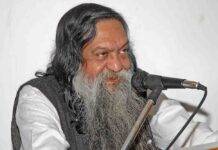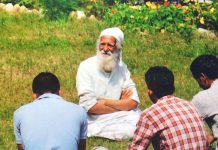TRIBUTE
Ashapurna Devi literary genius was that even when the context, the semantics, physical location, biographical sketches of her characters and times she wrote about were all complete with Bengali sensibilities the range of emotions that she captured through her works transcends her linguistic and immediate cultural setting.
The New Leam Staff
Ashapurna Devi (8th January 1909-13 July 1995) was a prominent Bengali novelist and poet. For her contribution as a novelist and short story writer, the Sahitya Akademi conferred its highest honour, the Sahitya Akademi Fellowship upon her in 1994. When she began her writing career she wrote mainly for children.

Chhoto Takurdar Kashi Yatra was the first printed edition published in 1983 followed by other important works throughout her literary career.
In 1936 she first wrote a story for adults, “Patni O Preyoshi”, published in a prominent Bengali newspaper. Prem O Prayojan was her first novel for adults (1944)
Several of her writings marked a spirited protest against the inequality and injustice coming from the patriarchal discrimination and narrowness of outlook ingrained in traditional Hindu society. Ashapurna Devi’s works spoke regarding the oppression women felt and made an appeal for a new social order. She was a determined believer in equal dignity for women but did not adhere to to the modern theoretical feminism of Europe. Her legendary creations including the trilogy Pratham Pratishruti (1964), Bakul Katha (1974), symbolises an endless struggle for women to achieve equal rights.
The passage given below is excerpted from Ashapurna Debi’s Pratham Pratisruti translated into English by Indira Chowdhury
Whatever the manner or circumstance of its occurrence, a wedding had to be celebrated with some grandeur. Not so much for fulfilling the need for a jamboree, but rather, out of necessity of informing society. It was hardly appropriate that the granddaughter of Lakshmikanta Banerji should one day, inadvertently and unexpectedly be installed within the inner quarters of the Chatterjis without anybody knowing anything about it. There had to be some proper document stating that her entry was legitimate. But what sort of document could that be? Not a written one, nor signed or attested, but the testimony of people. And how else could one procure that except by inviting the entire village to a feast?
Besides, the fact that a girl from the Banerji household now belonged to the Chatterji family had to be duly acknowledged. The groom’s side could have this fact endorsed by kith and kin, by making the bride serve them rice during the feast.
Therefore, a feast had to be arranged after a wedding. Since there was no prior warning there was a real rush to make arrangements. Ramkali never lacked devoted followers, and he had spread the word. The sandesh would come from Janai, the mihidana from Barddhaman. Tustu, the milkman, was to arrange for the yoghurt, and Bhima, the fisherman had been asked to arrange for the fish. Ramkali had been instructing them about the quantity of fish and in which lake they should cast their nets, when suddenly Mokshada appeared on the scene.
Apart from Mokshada, practically everybody feared Ramkali. She was the only one who dared to tell him things to his face. Even Dinatarini was afraid of her son. One might ask, of course, if and when did the question of telling Ramkali something to his face arise? After all, he was a man who carried out his duties perfectly! But arise, they did! And Mokshada never missed such opportunities. Because Mokshada judged things from her own perspective. What Ramkali regarded as absolute duty, Mokshada viewed as uncalled-for excess. And most of the time, the issue would be Satyabati! That was natural! If Ramkali had produced a daughter who was singular in the whole of India, shouldn’t Mokshada take the opportunity to tell him things to his face? So Mokshada would often drag that wretched girl to Ramkali and give a proper lashing!
And even now she hadn’t come alone to Ramkali’s court, she had brought Satyabati along. Satyabati had come without protest. Perhaps because she knew it would be of no use. Or, may be, because she was fearless. Mokshada waited in silence all the while Bhima, the fisherman was present; finally, when Bhima left after doing a pranam to Ramkali, Mokshada sprang into action. ‘Here Ramkali, now do something about this gem of your’s! And let me warn you, that’s what you’ll have to do it for the rest of your life, for this one will come back from her in-laws – that’s for sure!’ Mokshada paused for breath.Ramkali smiled mildly and asked, ‘Why, what has happened now?’‘It happens all the time!’ Mokshada shook her hand, ‘Happens while getting up or sitting down – cuts, bruises, tears. And now, just look at the state of your daughter’s hand! She’s scalded it and there’s a big blister! And she says `No need to tell father, it’ll get better.’ See for yourself.’Ramkali shuddered as he examined his daughter’s hand.‘What’s this? How did this happen?’‘Ask her how it happened. I’m forever reciting her talents to you, you never listen! But I’ll tell you this, Ramkali, there’s grief in store for you because of this girl!’This outburst was nothing new; it had been repeated all too often.
So it wasn’t as if Ramkali was really troubled. But Ramkali was trained in the etiquette of showing respect to elders, so he pretended to be perturbed.‘Really, this girl is the limit ! Now what did you do? How did you get this huge blister?’‘She was boiling milk! Madam went to boil the milk when Rashu arrived with his bride yesterday. And I say, you over-grown girl, how could you scald your hand doing such a simple task?’Ramkali examined the state of his daughter’s hand and spoke to her seriously, ‘Why did you have to go near the fire? Wasn’t there anybody else at home?’Satya inclined her head and replied, ‘It’s not burning too much.’‘That’s not the point, there are medicines to treat it. But tell me, why were you working near a fire?’Now Satya raised her head and began to speak rapidly in her characteristic manner, ‘As if I did that because I was dying to! I did it for the sake of boro-bou. Poor thing! Here she is suffering from the sting of a co-wife’s barb, and over and above that being ordered to boil the milk! She’s human after all!’ Satya’s clear explanation staggered not just Ramkali, but Mokshada too. What a brash girl! Answering back a father who was so distinguished! Mokshada put her hand to her cheek and fell silent. Ramkali was the one who spoke. He asked in a sharp tone, his brows furrowed: ‘And what do you mean by the sting of a co-wife's barb’? ‘Learn what it means from your daughter, Ramkali!’ Mokshada said with utter sarcasm before Satya could answer, ‘What we haven't learnt at our age, this slip of a girl has! A regular chatterbox! ‘Such bizarre accusations annoyed Satya. Why should people talk any way it suited them? She had just been calledovergrown girl’ and now she had become a `slip of a girl’. Anything that caught the fancy! Ramkali looked at his aunt and once more repeated his question in a thunderous voice, ‘Why haven’t you replied to my question? Why don’t you tell me what a co-wife’s barb is, and how it can sting? ‘As if Satya knew what it was! But she knew, I suppose, from before her birth, that it was a tormenting, painful thing. So with as anguished an expression as possible she said, ‘A co-wife is a barb, father! And when there’s a barb, it also stings! This is the sting you’ve inflicted on her..’‘Stop it!’ Ramkali scolded fiercely. He was irked now, and really troubled. And worried for his daughter’s future and pained by this confrontation with the squalor of her mind! He hadn’t thought this possible; it was beyond his expectation! What could have caused this? Numerous complaints about Satyabati would reach his ears but so far he had never paid much heed to them because he had perceived her to have a nature that was genuinely spirited. And he thought she was incapable of harbouring hatred or malice. That was what he credited her with in his assessment. So when had she learnt this vocabulary of hate?














